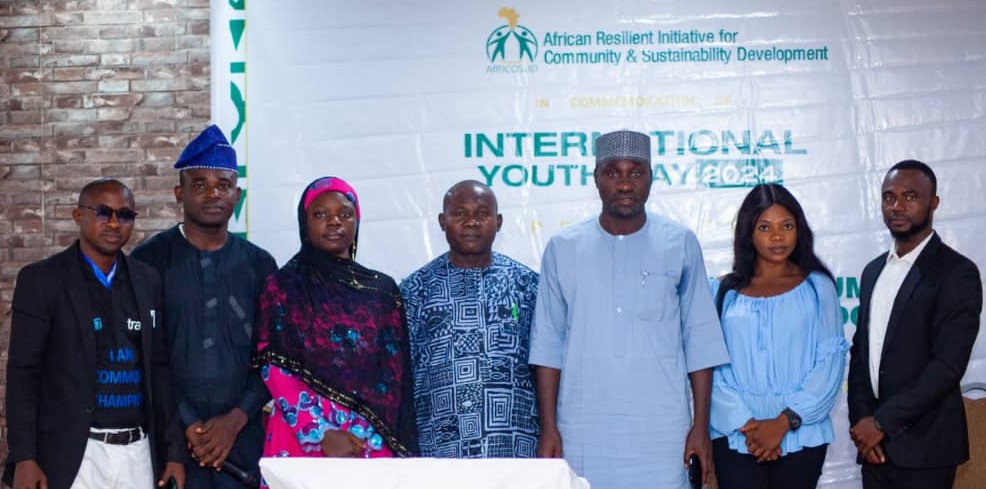By Queen Kunde
In commemoration of the 2024 International Youths Day, African Resilient Initiative for Community and Sustainable Development (AfRICOSUD), hosted an engaging youth-focused program aimed at providing a platform for deliberation on issues of good governance and sustainable development at the grassroots.
The program, a youth consultative forum on local governance and SDGs, the first of its kind in Taraba State, brought together youths and public servants, including the Commissioner for Youths and Sports Development, Hon. Joseph Joshua (represented by Acting Secretary Mr. Joshua Luka), the Jalingo Local Government Chairman who also doubled as the Taraba state Chairman of ALGON (Association of Local Government of Nigeria) and the Taraba State Coordinator for BudgIT, Mr. Samuel Bisong. The goal was to provide a platform for youth engagement and facilitate discussion on one of the country’s most pressing needs: active youth participation in local governance, especially in light of the July 11th ruling of the Supreme Court, which granted financial autonomy by mandating direct financial allocations to the 774 local government areas (LGAs).
The event was an opportunity to amplify youth voices to improve grassroots development, ensure good governance and, most importantly, explore how youths can become involved in local governance. The forum set the stage to consider how effective local governance would contribute to the actualization of the Sustainable Development Goals (SDGs).
Mr. Onyeka Nwigwe, the Executive Director of AfRICOSUD, kick started the event with a welcome address emphasizing the need to shift citizen’s attention toward the level of government closest to them: the local government. That young people are not trouble makers but changemakers when there is the right environment that support their aspirations to flourish.
According to the Executive Director, the organization applies a bottom-up approach to facilitate the active involvement of citizens at the grassroots. “This is where lasting and sustainable change happens,” he stated, emphasizing that this approach would create an enabling environment not just for the present but for future generations.
He urged participants to participate fully in the discussions with an open mind and be willing to have hard conversation for a rich outcome.
In his keynote address, Hon. Joseph Joshua, the Commissioner for Youths and Sports Development, represented by Acting Secretary Mr. Joshua Luka, reiterated that under the leadership of Governor Kefas, Taraba State has been a youth-focused government. This is evident in his recent policies, which have greatly benefited the youth, as well as in the number of youth appointments in the administration. “Governor Kefas is a youth-friendly governor,” he said.
Taraba State and Northeast Region Coordinator of BudgIT, Mr Samuel Bisong, emphasized that governance remains a two-way process. There must be people to hold those in governance accountable, and that’s where the youths come in. BudgIT promotes transparency between the government and the governed by utilizing data to facilitate societal change.
He posited that more infrastructural developments can be carried out and citizens’ welfare can be met if youths ensure that resources are allocated to priority areas and they collaborate with others to drive collective action in their communities. In addition, tools like Tracka and GOVSPEND ensure that citizens have the needed data on government spending and promote transparency in the implementation of subnational projects. These tools and data would enable young people to engage those in governance by asking the right questions. Therefore, young people should continue to organize and collaborate, and power their advocacy with data.
During a panel session moderated by Aisha Hammanjoda, which included the Jalingo Local Government Chairman as represented by the Supervisory Councilor, Mr. Samuel Bisong of BudgIT, Mr. Samuel Suntai of Peace and Conflict at Taraba State University, and Ms. Aminchi Nicolas, a youth activist, several issues were discussed and important takeaway for reform These included the challenges and opportunities for youth participation in local governance, relevance and assessment of the effectiveness of the supreme court ruling and case studies of youth initiatives that can be scaled.
The Chairman of Jalingo Local Government Council revealed that the local government is working with the Advisory Committee set up by the Taraba state government for a smooth transition and implementation of the ruling.
Mr. David Suntai, a peace scholar at the Taraba state University, during the panel session noted how effective local governance promotes peaceful society, “The structural violence that exists due to lack of efficient governance structure at the grassroots that meets the basic needs of young people in their communities often predisposes youths to physical violence, good governance at the local level promotes peace and they are interrelated” he said.
Participants acknowledged that with continuous fora like this, more young people will be informed and equipped to participate in local governance process while others highlighted that laziness, disillusionment, polarity from tribal and religious difference and lack of platform had hindered effective youth engagement in the past.
The Youth Consultative Forum clearly indicated that the youths of Taraba State are eager to have their voices heard and to be given the opportunity to participate actively in governance.
